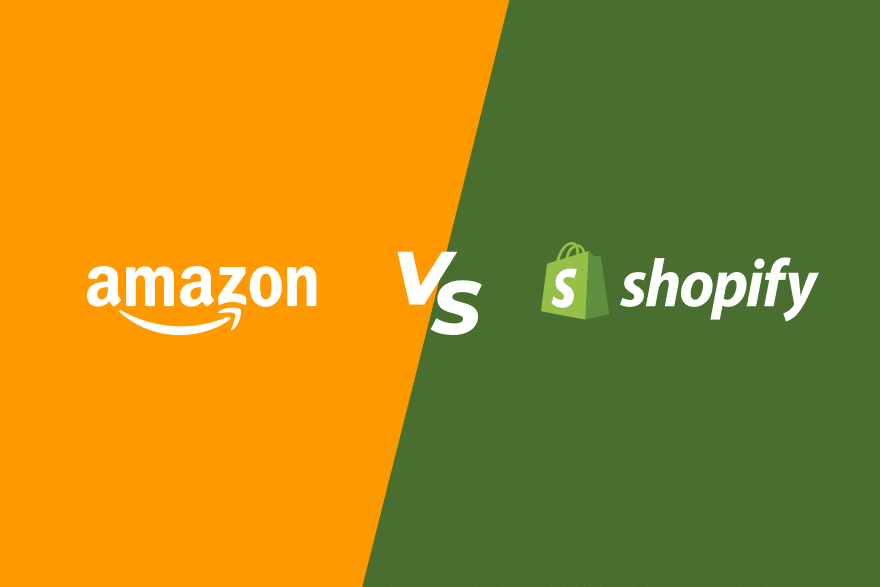Shopify vs Amazon :Unveiling the Best Platform for Your Online Store
Shopify is a self-hosted platform that enables you to create an eCommerce website (or online store). Shopify is backed by powerful tools that help you drive sales and manage day-to-day online business operations. More than 1,000,000 merchants in 170+ countries use Shopify to run their online business.
Amazon is one of the largest eCommerce marketplaces globally. The astonishingly large number of products available on Amazon, however, are not sold by Amazon alone. Half of the products are sold by third-party sellers. And you too become one of those sellers. Amazon offers a diverse range of options for selling and shipping products via the platform.
Key Features of Amazon
- Amazon charges 99 cents per sale plus referral percentages for individual sellers.
- You can list a diverse range of products and opt for Fulfillment by Amazon.
- For professional merchants, Amazon charges $39.99/month plus referral charges.
- If you choose Amazon’s Fulfillment services, your products will be stored and managed in an Amazon warehouse.
- Fulfillment also covers inventory management and shipping by Amazon.
- Amazon gives you access to massive amounts of traffic without much effort.
- The platform’s global brand reputation helps you in driving sales.
Key Features of Shopify
- Shopify is a self-hosted eCommerce platform focused on independent merchants.
- It enables you to build your online store without using any coding.
- Since Shopify is self-hosted, you don’t need to manage a server.
- Offers three pricing plans, starting from $29/month.
- Shopify charges 2% transaction fees on all sales that don’t use Shopify payment.
- Basic Shopify offers 24×7 customer support, unlimited product listing, SSL certification, and more.
- Advanced Shopify offers 15 staff accounts, premium customer support, Shipping discount up to 74%, and more
Difference Between Amazon and Shopify
The most striking difference between Amazon and Shopify lies in their basic functional structure. While Shopify is a specialized eCommerce development platform, Amazon is a globally leading online marketplace. In other words, Shopify gives you the framework and tools to build an online store, whereas Amazon provides you with a vast online marketplace.
Amazon makes your transition to eCommerce incredibly easier. But Shopify enables you to go beyond just selling online. Using Shopify, you can create your online store and establish a unique brand identity.

Amazon vs. Shopify — Comparing Major Capabilities
eCommerce Design
Design plays a crucial role in converting store visitors to shoppers. Both Shopify and Amazon offer enticing designs. Shopify allows you to create shopping features focused on customer experience. It has a diverse range of design templates and extensions. Use the templates of your choice and build a store that reflects brand identity.
With Amazon, however, design options are limited. Since virtually all product pages on Amazon have a similar layout, engaging shoppers could be challenging. You can upload your product images and videos, but the overall look reflects Amazon’s brand identity, not yours.
User Experience
User experience is king, no matter how small or vast your online store is. Shopify allows you to build online stores that offer fully immersive user experiences. Be it responsive design or navigation, Shopify impresses every customer. The clean and enticing design of Shopify helps you attract visitors and convert them into paying customers.
Amazon is known for its user-friendly capabilities. Easy product search, quick product comparison, and seamless payment processing, etc. make Amazon a preferred online shopping platform all over the world. You can further enhance the experience for your customers by choosing Fulfillment by Amazon.
Online Commerce Tools & Functionalities
Shopify offers an extensive range of tools and features. These cover everything, from designing and developing your online store to the product listing, selling, payment processing, and shipping. Besides, if you choose custom Shopify eCommerce development, you get to personalize the store per your specific needs.
Other tools and features that Shopify offers include logo maker, abandoned cart recovery, omnichannel selling, app integration, and automatic tax calculation.
Amazon is a limitless platform for selling and buying goods online. Merchants get an array of tools and features to list their products for millions of daily visitors. Fulfillment by Amazon, for instance, gives you access to Amazon Prime features. It ensures efficient product handling, packing, delivery by Amazon.
Payment Processing
Shopify enables you to accept payment via all major payment gateways. However, it prefers its payment gateway, Shopify Payments. The platform charges a transaction fee for payment processing. But if you use Shopify payments, there are no charges at all.
In all, Shopify offers more than 100 payment gateways, including Amazon Pay, Google Pay, and PayPal. Transaction fees for these gateways range from 0.5% to 2%, depending on which gateway you use. You can also use credit and debit cards.
As expected, Amazon prefers Amazon Pay as the primary payment gateway. Merchants can accept credit cards, debit cards, and other payment channels, except PayPal. If you choose Fulfillment by Amazon, it costs additional fees. Professional sellers also need to pay a monthly subscription. Individual sellers have to pay $0.99 for every product they sell.
Customer Support
Shopify is known among merchants worldwide for its unmatched customer support. The support options include 24×7 phone support, social media support, round-the-clock live chat, and email, and specialist support.
Different support options are available according to the Shopify plan you choose. Shopify Plus, for example, offers dedicated, quickest tech support and troubleshooting. Besides, Shopify also manages a Help Center that comprises guides and articles.
Amazon doesn’t have a customer support system as extensive as Shopify. The support options include 24×7 phone support, request a call, live chat, and a support community.
Amazon or Shopify — Where Should You Sell?
Both Shopify and Amazon have their unique capabilities and downsides. While Amazon comes with a ready-to-engage target audience, Shopify lets you establish a brand identity. Ultimately, you have to choose the most suitable platform for your online business.
Shopify gives you immense design flexibility and customization capabilities. It creates a platform for establishing a brand and expanding your online business. However, you have to undertake the arduous task of marketing your online business. If you are just starting up and need a readily available customer base, Amazon would be the right platform.
Shopify is suitable for merchants who want to stand out and create an online brand. You can also choose Shopify eCommerce development services to build a fully personalized online store.


